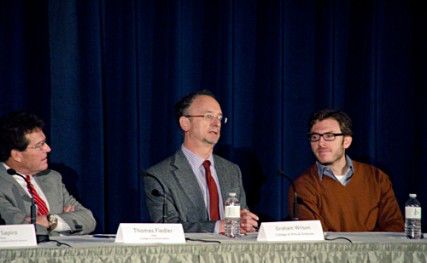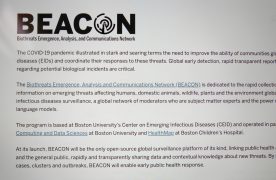
While College of Communication sophomore Candace Shelton was ineligible to vote in 2008, she said she intends to cast her vote for in November.
“Looking back at me in high school, I would’ve done it just to be like everyone else, to be honest,” she said.
Yesterday, Shelton was one of 30 students, faculty and alumni who attended “BU’s Road to Washington,” the first in a series of panels held by the Boston University Alumni Association. However, the audience had few students and no participation in the question and answer sessions.
The audience listened to panelists, including College of Arts of Sciences Dean Virginia Sapiro, COM Dean Thomas Fiedler, political science department Chair Graham Wilson, advertising department member Tobe Berkovitz and Dino Christenson, an assistant political science professor, about a number of issues candidates will likely address in the presidential race.
Panelists explored issues from the role of social media to student debt to campaign funding and spending. They debated whether the election will determine whether or not voters will “fire” Obama, with issues such as class warfare issue and unemployment continuing.
“I thought it was interesting how they thought to level the playing field a little bit,” Shelton said.
“They weren’t advocating for any person who’s running, but just trying to explain what’s happened so far [on the campaign trail].”
Berkovitz said independent voters will play a large role in this coming election, as they account for 50 percent of registered voters in Massachusetts.
“Despite the highly partisan environment, I really think that 2012 is make or break for the candidates by independents,” he said.
Members of the audience asked the panelists questions from the issues to how one should handle the responsibility of voting. One audience member who had never voted before in the American system said he was fascinated with it because he wasn’t sure about the process.
Shelton said she feels confident in how she will cast her vote this year.
“I’m more informed on the issues,” she said.
While the panel did not focus on the youth vote, its speakers said in an interview with The Daily Free Press students should focus on the candidates’ policies and responses to issues.
“Both parties are going to have to ask themselves whether they’re going to be able to mobilize this vote like they did before [in 2008],” Fiedler said. “If President [Barack] Obama isn’t able to at least get close to that, it could be a real problem for him.”
College of Arts and Sciences junior Demarius Walker did not attend the panel discussion, but said he remains attentive to issues regarding the election in November. While he voted for Obama in 2008, he said he intends to vote for another candidate. While he said he doesn’t know who, he confirmed he plans to vote for someone.
“That’s my duty as an American citizen,” Walker said. “I have to exercise my right to vote.”
Fiedler said that this election isn’t going to have the same youth pull that the 2008 election did. Being able to vote the first Black president into office was engaging in a way that cannot be replicated. That dream, he said, has already been accomplished.
Shelton said she would have liked to hear more discourse about the youth vote, but figures the panel preferred to focus on the issues more relevant to the professors and alumni who were present.
“I guess I can say I was a little disappointed,” she said.
Sapiro said while the panel did not speak about the youth vote issue, the demographic can have an impact on the election results.
“This could be a really close election,” Sapiro said, “[but] among the people who are most likely to stay home are young people, even though there are a lot of issues that affect college-age students very seriously.
“Students could make a huge difference.”
This is an account occasionally used by the Daily Free Press editors to post archived posts from previous iterations of the site or otherwise for special circumstance publications. See authorship info on the byline at the top of the page.












